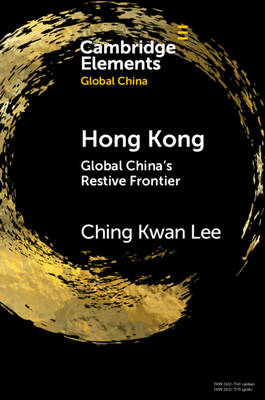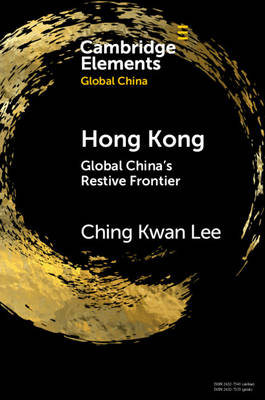
Door een staking bij bpost kan je online bestelling op dit moment iets langer onderweg zijn dan voorzien. Dringend iets nodig? Onze winkels ontvangen jou met open armen!
- Afhalen na 1 uur in een winkel met voorraad
- Gratis thuislevering in België vanaf € 30
- Ruim aanbod met 7 miljoen producten
Door een staking bij bpost kan je online bestelling op dit moment iets langer onderweg zijn dan voorzien. Dringend iets nodig? Onze winkels ontvangen jou met open armen!
- Afhalen na 1 uur in een winkel met voorraad
- Gratis thuislevering in België vanaf € 30
- Ruim aanbod met 7 miljoen producten
Zoeken
Omschrijving
How did Hong Kong transform itself from a 'shoppers' and capitalists' paradise' into a 'city of protests' at the frontline of a global anti-China backlash? CK Lee situates the post-1997 China-Hong Kong contestation in the broader context of 'global China.' Beijing deploys a bundle of power mechanisms - economic statecraft, patron-clientelism, and symbolic domination - around the world, including Hong Kong. This Chinese power project triggers a variety of countermovements from Asia to Africa, ranging from acquiescence and adaptation to appropriation and resistance. In Hong Kong, reactions against the totality of Chinese power have taken the form of eventful protests, which, over two decades, have broadened into a momentous decolonization struggle. More than an ideological conflict between a liberal capitalist democratizing city and its Communist authoritarian sovereign, the Hong Kong story, stunning and singular in its many peculiarities, offers lessons about China as a global force. This title is also available as Open Access on Cambridge Core.
Specificaties
Betrokkenen
- Auteur(s):
- Uitgeverij:
Inhoud
- Aantal bladzijden:
- 75
- Taal:
- Engels
- Reeks:
Eigenschappen
- Productcode (EAN):
- 9781108823913
- Verschijningsdatum:
- 8/09/2022
- Uitvoering:
- Paperback
- Formaat:
- Trade paperback (VS)
- Afmetingen:
- 152 mm x 229 mm
- Gewicht:
- 136 g

Alleen bij Standaard Boekhandel
+ 63 punten op je klantenkaart van Standaard Boekhandel
Beoordelingen
We publiceren alleen reviews die voldoen aan de voorwaarden voor reviews. Bekijk onze voorwaarden voor reviews.











